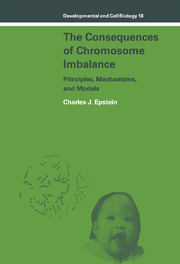Book contents
- Frontmatter
- Contents
- Preface
- Glossary
- PART I INTRODUCTION
- PART II CLINICAL OBSERVATIONS
- PART III THE THEORETICAL MECHANISMS AND ISSUES: THE PRIMARY AND SECONDARY EFFECTS OF ANEUPLOIDY
- PART IV EXPERIMENTAL SYSTEMS FOR THE STUDY OF MAMMALIAN AND HUMAN ANEUPLOIDY
- PART V THREE MAJOR CLINICAL PROBLEMS OF HUMAN ANEUPLOIDY
- 12 Trisomy 21 (Down syndrome)
- 13 Monosomy X (Turner syndrome, gonadal dysgenesis)
- 14 Cancer
- PART VI CONCLUSION
- Appendix: Standard karyotypes of man and mouse and human cytogenetic nomenclature
- References
- Index
- Frontmatter
- Contents
- Preface
- Glossary
- PART I INTRODUCTION
- PART II CLINICAL OBSERVATIONS
- PART III THE THEORETICAL MECHANISMS AND ISSUES: THE PRIMARY AND SECONDARY EFFECTS OF ANEUPLOIDY
- PART IV EXPERIMENTAL SYSTEMS FOR THE STUDY OF MAMMALIAN AND HUMAN ANEUPLOIDY
- PART V THREE MAJOR CLINICAL PROBLEMS OF HUMAN ANEUPLOIDY
- 12 Trisomy 21 (Down syndrome)
- 13 Monosomy X (Turner syndrome, gonadal dysgenesis)
- 14 Cancer
- PART VI CONCLUSION
- Appendix: Standard karyotypes of man and mouse and human cytogenetic nomenclature
- References
- Index
Summary
Virtually every review of the cytogenetics of cancer begins with a reference to Boveri (1914), and this is certainly not inappropriate. He anticipated a relationship between aneuploidy and malignancy several decades before a relation between aneuploidy and any human disease was first established. His principal ideas, as quoted by Hauschka (1961), were the following:
The essence of my theory is … in general, a definite abnormal chromosome complex … asymmetrical mitosis could be chiefly considered for the origin of tumors. … My theory is able to explain above all the defective histological form and altered biochemical behavior of tumor cells. Are there any means of reaching a trustworthy decision as to the correctness of the views presented here? The most obvious would be to devote renewed attention to the counting of chromosomes, if possible with better techniques.
The required improvements in techniques did not occur for over forty years, but when they did, the validity of Boveri's insight was finally established. As viewed by Sager (1983), “Boveri's contribution to clear thinking about cancer ranks nearly with Mendel's contribution to clear thinking about genes. Written close to 70 years ago, Boveri's view of the origin of cancer anticipates much of what we know today.” What still remains to be accomplished, as will be discussed in this chapter, is to discover the meaning of the relationship between aneuploidy and malignancy.
- Type
- Chapter
- Information
- The Consequences of Chromosome ImbalancePrinciples, Mechanisms, and Models, pp. 344 - 366Publisher: Cambridge University PressPrint publication year: 1986
- 1
- Cited by

